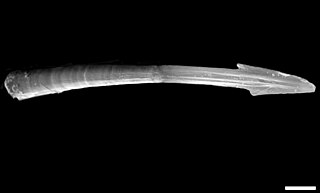
A snail is, in loose terms, a shelled gastropod. The name is most often applied to land snails, terrestrial pulmonate gastropod molluscs. However, the common name snail is also used for most of the members of the molluscan class Gastropoda that have a coiled shell that is large enough for the animal to retract completely into. When the word "snail" is used in this most general sense, it includes not just land snails but also numerous species of sea snails and freshwater snails. Gastropods that naturally lack a shell, or have only an internal shell, are mostly called slugs, and land snails that have only a very small shell are often called semi-slugs.

The gastropods, more commonly known as snails and slugs, belong to a large taxonomic class of invertebrates within the phylum Mollusca, called Gastropoda. This class comprises snails and slugs from saltwater, from freshwater, and from the land. There are many thousands of species of sea snails and slugs, as well as freshwater snails, freshwater limpets, and land snails and slugs.

Trematoda is a clade within the phylum Platyhelminthes. It includes two groups of parasitic flatworms, known as flukes.

Ampullariidae, common name the apple snails, is a family of large freshwater snails, aquatic gastropod mollusks with a gill and an operculum. This family is in the superfamily Ampullarioidea and is the type family of that superfamily.

Sea snail is a common name for snails that normally live in salt water, in other words marine gastropods. The taxonomic class Gastropoda also includes snails that live in other habitats, such as land snails and freshwater snails. Many species of sea snails are edible and exploited as food sources by humans.
Aaadonta constricta is a species of land snail, a terrestrial pulmonate gastropod mollusk in the family Endodontidae. It is endemic to Palau, where it is known from the islands of Babeldaob, Ngemelis, Peleliu and Koror. It may be extirpated from Koror. It is threatened by habitat destruction and modification.
Palaua is a genus of very small air-breathing land snails, terrestrial pulmonate gastropod mollusks in the family Euconulidae, the hive snails. This genus is endemic to Palau.
Palaua margaritacea is a species of very small air-breathing land snail, a terrestrial pulmonate gastropod mollusk in the family Euconulidae, the hive snails. This species is endemic to Palau.
Palaua ngarduaisi is a species of very small air-breathing land snail, a terrestrial pulmonate gastropod mollusk in the family Euconulidae, the hive snails. This species is endemic to Palau.
Palaua straminea is a species of very small air-breathing land snail, a terrestrial pulmonate gastropod mollusk in the family Euconulidae, the hive snails. This species is endemic to Palau.
Palaua wilsoni is a species of very small air-breathing land snail, a terrestrial pulmonate gastropod mollusk in the family Euconulidae, the hive snails. This species is endemic to Palau.

Palaua is a genus of malvaceous plants native to the Andes. It shares with Malope and Kitaibelia the property of possessing capitate schizocarps, and was formerly classified with them in a subfamily Malopoideae or tribe Malopeae. It is now considered to be more closely related to Sphaeralcea, and to other Andean mallows.

Euconulidae is a taxonomic family of minute, air-breathing land snails, terrestrial pulmonate gastropod mollusks or micromollusks. This land snail family is closely allied to the Zonitidae, the glass snails.

A love dart is a sharp, calcareous or chitinous dart which some hermaphroditic land snails and slugs create. Love darts are both formed and stored internally in a dart sac. Love darts are made in sexually mature animals only, and are used as part of the sequence of events during courtship, before actual mating takes place. Darts are quite large compared to the size of the animal: in the case of the semi-slug genus Parmarion, the length of a dart can be up to one fifth that of the semi-slug's foot.

Freshwater snails are gastropod mollusks which live in freshwater. There are many different families. They are found throughout the world in various habitats, ranging from ephemeral pools to the largest lakes, and from small seeps and springs to major rivers. The great majority of freshwater gastropods have a shell, with very few exceptions. Some groups of snails that live in freshwater respire using gills, whereas other groups need to reach the surface to breathe air. In addition, some are amphibious and have both gills and a lung. Most feed on algae, but many are detritivors and some are filter feeders.
Aaadonta constricta babelthuapi is a subspecies of land snail, a terrestrial pulmonate gastropod mollusk in the family Endodontidae. It is endemic to Palau, where it was previously known from Babeldaob and Ngemelis. It is now only known from Ngatpang. It is threatened by destruction or modification of its habitat.

Terrestrial molluscs or land molluscs (mollusks) are ecological group that includes all molluscs that lives on land in contrast to freshwater and marine molluscs.











